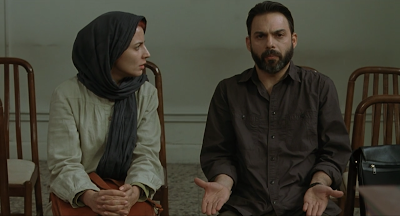The third person perspective of Asghar Farhadi's A Separation (2011)
A SEPARATION
by
Asghar Farhadi
Being the third person isn't always easy. Particularly when you can not disagree with either party and you have to make a call after listening to their respective emotional ground. Maybe that's why our judicial systems did not choose to operate from an emotional perspective. It is a much simpler & objective: "Did you do it or not?" kinda scenario. However, things are never as plain and simple as this and everything is nuanced. Everything is subjective and relative. What Asghar Farhadi's 'A Separation' does to you is that it puts you right in the judge's seat and presents to you all their nuanced & emotional arguments and their standpoint which is unique and is a result of their economic/religious background, childhood, their own personal agenda, and is a virtue several other influences in their lives at that point. It shouts its point of why everyone might not be equal before the law to your face and then rhetorically asks you to make a judgment.
That’s literally what the opening scene of 'A Separation' is all about. We are at a court with the camera set at an angle that resembles a judge’s perspective and a couple filing for divorce after staying together for 14 years present their own set of arguments looking straight into it. It is a brilliant premise for two reasons. One, it engages us right into the film. Two, it sets us up for the difficult task by deliberately making us look at these characters from a third-person perspective. While doing all that Asghar Farhadi makes us care for these characters and makes their actions more consequential by skilfully merging our perception which began as third-person alien to these character's world with that of their daughter. And she is the one who needs to decide who gets her custodial right after the divorce.
There is no musical score in the film except for the ambient background noises and foleys. And with a very grounded work using handheld camera movements & POV shots, the third-person perspective is real. But the circumstances though, are very dramatic. The writing is what the film is all about. There is literally zero scope for exposition and we understand things from what we see and know, just like we do in real life. The goals of a character are narrated through their actions, their reactions & behaviour, although we get a peek into their inner conflicts as a part of "viewer's prestige". Everyone is grey, there are no good or bad people, but what the film believes is that you are only as good as your move whilst your worst confrontation. As the film dwells deep into the conflicts, the characters find themselves with a choice at every turn, they can either lie and play victim exploiting the situation to their benefit, or tell the truth and accept the accusation. But the only problem is that: no one knows the whole truth while their only agenda is not to be proven guilty. And so they start creating their own versions of it, for, it may severely affect the lives of their families if the accusations made against them turn out to be true. They end up accusing one another into a stalemate which finally breaks because of their faiths and beliefs, because of their "character". Though it is a regular three-act structure, the central idea and the way it is presented make it an engaging and thought-provoking observation.
The film also comprises many subtexts about parenting. Neither of the parents wants to be a "bad person" in the eyes of their children, deep down wants to protect their family from falling apart, and try their best to conceal their uglier side in many helpless situations. Maybe they're trying to protect their children from being exposed to the darker aspects of the world they're aware of. But, it is only a matter of time. A fact everyone knows but denies. For Termeh, it is in her teens in a time around her parents' divorce, but for Somayeh, it is too early. She is barely 10 years old. And the film has something to say about religion as well. The two families represent two different modalities of people. One of them is progressive & not very religious, while the other is highly orthodox. The film is not judgemental about their beliefs, rather it allows this situation to act as a foundation to one of its conflict and ultimately its resolution (eh, sort of). It is a healthy discussion, non-offensive but nuanced.
It is difficult to come out of the film with a well-defined solution and it is impossible to take it out of your mind for a really long time. It is a gripping drama with progression as that of a thriller. It is a very vocal film with a resonating voice. It is quite cynical yet it stands on a very humane ground and is very capable of changing the way we see think and look at people in general. Remember the first time you realised you're parents are flawed people too. This film is that feeling. It is paradoxical and endless.







Comments
Post a Comment